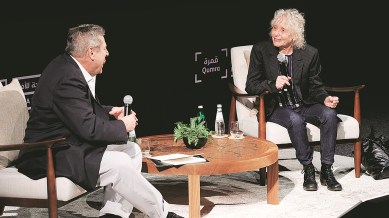‘It is more important than ever that people can come here and tell their stories’: Doha Film Institute CEO Fatma Hassan Alremaihi
At the tenth edition of Qumra, a Doha Film Institute initiative, participants investigate questions around conflict and identity and the importance of individual cinematic voices.

“Where are you from,” asks Claire Denis as we settle ourselves around her for a chat. The celebrated French auteur is at the tenth edition of Qumra, a Doha Film Institute (DFI) platform which has been created to showcase underrepresented voices from around the world, with a strong focus on growing local cinema in Qatar, and other parts of the Middle East regions.
When I say India, her eyes light up. She recalls a trip to Pune, and a rain-soaked drive from Mumbai at the height of the monsoon. “They told me that a French person wouldn’t be able to stand the rains, but I loved it,” she says, “It was so different from the rainy season in Africa (where she grew up) and oh, the sights and smells.”
monthly limit of free stories.
with an Express account.
At 78, Denis is a formidable presence, slender and elegant and vital in black, accessorised with an eye-catching Chanel tote, which she dumps casually at her feet during her master-class. The two-hour session gives us a detailed overview of her body of work, which interrogates the powerful connection between people, post-colonialism and identities, among her primary concerns, which grew out of a childhood spent in Africa.
Denis is one of the six Qumra ‘masters’ at this latest edition which concluded earlier this month. The other five are Toni Collette, Australian actor and producer whose work leans towards spiky individualism even at her most mainstream; Leos Carax, who works hard to cement his enfant terrible image, using shock-and-awe tactics to spectacular effect at his best, which remains, the utterly unforgettable Holy Motors, 2012; Canadian New Wave proponent Atom Egoyan, best known for his 1997 The Sweet Hereafter; legendary director-producer-playwright Jim Sheridan whose collaborations with Daniel-Day Lewis (My Left Foot, 1989; In The Name Of The Father, 1993) remain ground-breaking; and the multiple award-winning sound designer and editor Martín Hernández with his prodigious body of work (Amores Perros, 2000; City Of God, 2002; Pan’s Labyrinth, 2006; Babel, 2006;Into The Wild, 2007; On The Road, 2012; Birdman, 2014; The Revenant, 2015).
The six-day, meticulously curated event attracts over 200 film professionals, ranging from festival programmers and agents on the look-out for exciting new talent, directors and producers looking for funding and mentorship, promising local filmmaking talent and invited press persons. It is a busy programme, bookended with the master-classes and screenings, with much-needed breaks of meals brimming with local delicacies (I can live on muhammara, of which I consume copious amounts).
The first of the conversations with Collette, whose breakout part in the 1994 Muriel’s Wedding stays fresh in our memories, is quite a delight. Many of her roles, in such older films as About A Boy (2002), and Little Miss Sunshine (2006), and more recently, the 2019 crime thrillers Unbelievable and Knives Out, have been reflective of the problems of fitting in, and the importance of being yourself. Fitting precursors for the close encounter in which she appears to be warm and self-aware, drawing parallels between acting and meditation, while speaking of her future productions.
Part of the pleasures of these detailed conversations is the inclusion of film clips. Watching snatches of Day-Lewis’s masterful performance in My Left Foot, which got him a well-deserved Oscar for Best Actor, makes you realise just how much effort goes into creating an unforgettable character. Quite appropriately, Sheridan speaks of humanity and evanescence as essential qualities in any work of art, and leaves us thinking when he says, “In some deep way, all art is propaganda, and I’m not ashamed to say that I’m a propagandist.”
This is in response to a question from a Palestinian filmmaker who asks how he wasn’t dubbed a ‘propagandist’ when he, Sheridan, was making films that involved the IRA (Irish Republican Army). And it is fitting that the query comes from a Palestinian filmmaker: the awareness of the on-going conflict in Gaza is a constant undercurrent at the Doha event, even if a direct reference to it comes only from Egoyan, who says, “The Palestine situation is horrifying”.
Egoyan also speaks of never having gone to film school, but watching Scorsese’s Raging Bull (1980) over and over again as learning ground, of being lucky to get interesting TV projects but not taking them seriously because he was “so consumed by features”, and the importance of rehearsals when you do “10-15 days of super fast shooting”. It is a true master class in openness.
It takes time for a platform which champions individual voices over mass production, to show results. This year, seven DFI-supported films were programmed at the 2024 Berlinale, including two in the Competition section — Shambala, the first-ever entry from Nepal, and Who Do I Belong To, a moving story of a Tunisian woman whose family is impacted by conflict. “We have been working towards this moment,” says DFI CEO Fatma Hassan Alremaihi, “Now it is more important than ever that people can come here and tell their stories.”